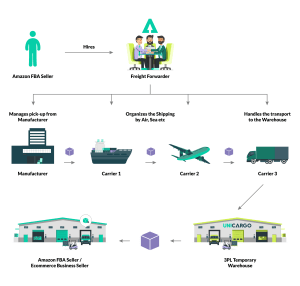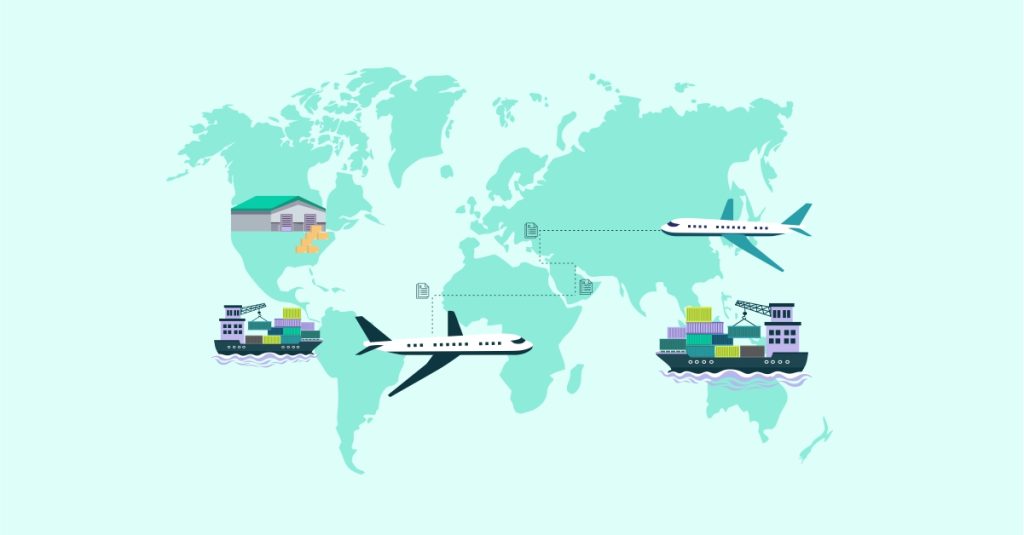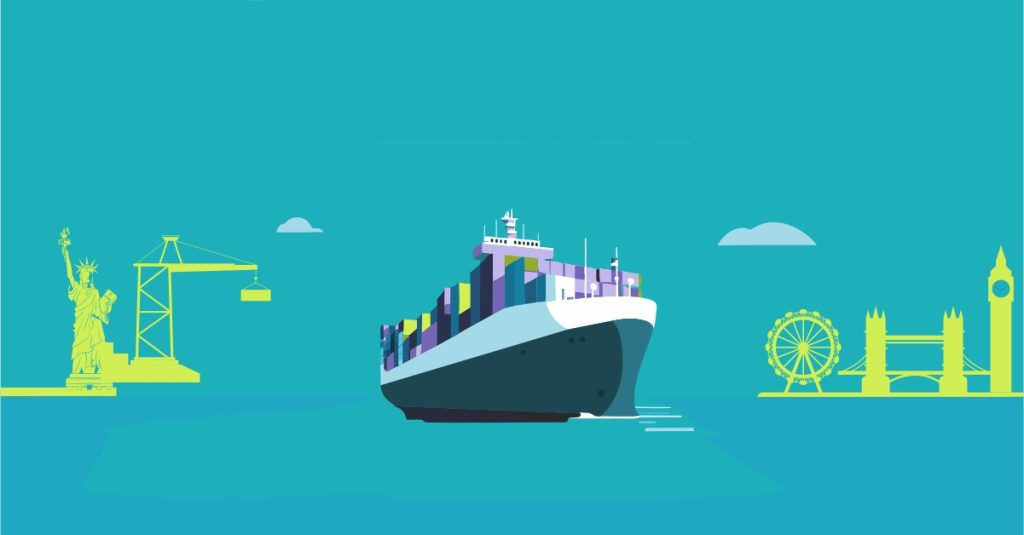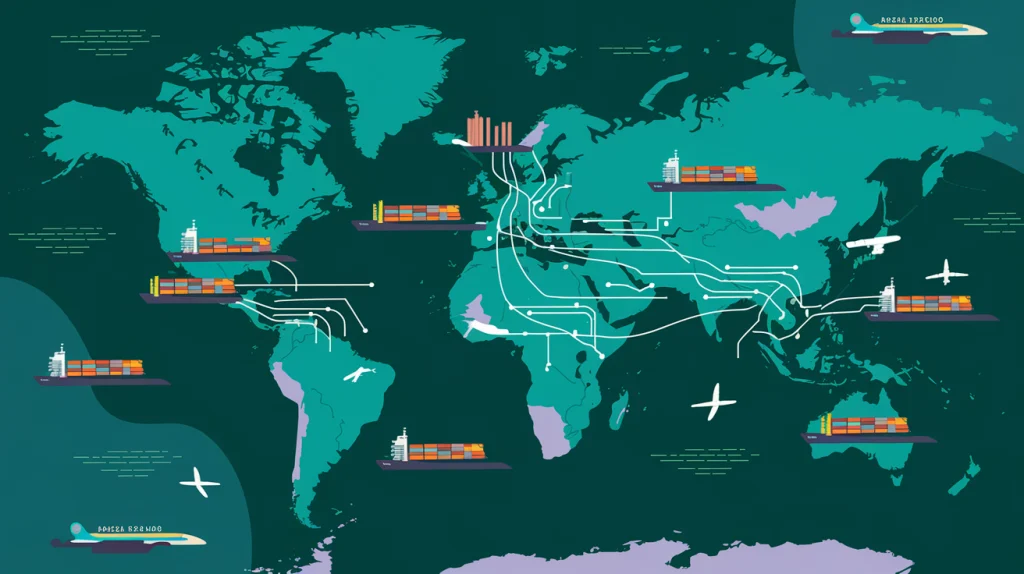Caught in the web of international shipping rules? Does it leave you with a pressing inquiry like “Do I need a freight forwarder for Amazon FBA?” A report reveals FBA’s widespread appeal in the top Amazon marketplaces.
Yet, for Amazon FBA sellers, international shipping means customs clearance hurdles, transit mishaps, product bans, and strict rules. It’s a real-time suck and more unpredictable than a soap opera with plot twists.
That’s where an experienced Amazon FBA freight forwarder is vital for handling these shenanigans. These experts ensure efficient global inventory movement by managing complex supply chains, diverse logistics, paperwork, payments, and customs brokerage.
In this article, we discuss the process of hiring a freight forwarder — covering costs, evaluating partners, crucial considerations, and must-have contract elements.
So, are you ready for seamless global FBA shipping? Jump right in!
Amazon Freight Forwarding Process: Key Takeaways
- Amazon Freight Forwarding (AFF) is vital for FBA sellers, acting as a middleman between sellers and Amazon’s fulfillment centers.
- AFF has two options: 3rd Party Freight Forwarding (3PL) and Amazon Global Logistics (AGL).
- AGL, Amazon’s in-house program, offers strategic benefits like quicker shipping and integrated services but has limitations.
- 3PL provides more flexibility and personalized services, making it suitable for diverse shipments.
- Choosing between AGL and 3PL depends on your business needs. Combining both can be beneficial to fill gaps and enhance efficiency in the supply chain.
- When hiring an Amazon freight forwarder, ask about their experience, rates, transit times, cargo insurance, customs clearance, end-to-end logistics, and customer service.
- When choosing a freight forwarder, consider factors like expertise, services offered, credentials, financial stability, tracking capabilities, delivery options, insurance coverage, and customer service.
- Research, request quotes, compare, negotiate, review insurance options, confirm communication channels, understand limitations, and sign a contract with clear clauses to ensure a successful partnership.
- Estimating AFF costs is complex, influenced by product types, weight, volume, origin/destination, chosen shipping method, and additional fees.
What Is Amazon Freight Forwarding?
Simply put, freight forwarding refers to managing the movement of goods, from negotiating rates with carriers to handling documentation and customs clearance. They might also bundle shipments, offer storage, and take last-mile delivery.
But what is a freight forwarder on Amazon?
Freight forwarders on Amazon are crucial for FBA sellers selling products on the big Amazon e-commerce platform. They act as a middleman between sellers and Amazon’s fulfillment centers. So, how does freight forwarding work for Amazon sellers in actuality?
How Amazon Freight Forwarding Operates?
Amazon freight forwarding involves coordinating transportation for inventory from the supplier/manufacturer to Amazon fulfillment centers. This includes negotiating and organizing shipments via ocean or air freight, handling customs clearance and documentation, and offering real-time tracking.
Services also include packing according to FBA guidelines, inventory management, and shipment insurance. Some freight forwarders also cover warehousing near Amazon centers to store the sellers’ inventory until it’s ready for shipment to Amazon fulfillment centers. Here’s a simple illustration of how an Amazon freight forwarder works:

You have two options in Amazon freight forwarding though: 3rd Party Freight Forwarding (3PL) and Amazon Global Logistics (AGL).
3rd Party Freight Forwarding vs. Amazon Global Logistics
In 2020, Amazon Logistics brought in more than $80 billion in global revenue. On the other hand, the entire global 3PL industry raked in an impressive $961.8 billion during the same year.
Both 3rd Party Freight Forwarding and Amazon Global Logistics help you ship goods to Amazon. But they differ in who’s in charge and how much control you get. With 3rd Party, you hire another company to handle the transport from the manufacturer/warehouse to an Amazon fulfillment center.
A study found that 86% of Fortune 500 companies in the United States utilize 3PL providers for diverse logistics and supply chain functions. This percentage isn’t surprising because 3PLs are experts in handling global shipping regulations and securing optimal deals for both providers and shippers.
They cover all the steps in the supply chain and offer services like storing your goods, shipping them, and ensuring orders get fulfilled. Plus, they can throw in extras like packaging, assembly, and kitting.
On the other hand, Amazon Global Logistics is Amazon’s own shipping program. It links Amazon Marketplace Sellers, Amazon Business Sellers, Amazon customers, and Fulfilled by Amazon (FBA) services to global shipping options.
AGL ships your goods from China and Hong Kong to Amazon marketplaces or Warehousing and Distribution (AWD) spots. It’s an Amazon upstream bulk inventory solution for 3P sellers seeking extended storage and automatic restocking into FBA.
Sellers can join AGL and request a shipment via Seller Central, accessible in the US, UK, EU, and Japan. AGL is easy to use and connects seamlessly with your Amazon seller account. Amazon handles all the paperwork and logistics and is responsible for any lost or damaged shipments.
But is 3rd Party Freight Forwarding better than Amazon Global Logistics or not? Read the pros and cons of both services and decide by yourself.
Amazon Global Logistics
Upsides:
- It taps into Amazon’s vast network of global fulfillment centers, strategically placing your inventory near potential buyers. This results in quicker shipping and enhanced customer satisfaction.
- It offers a pickup service to collect cargo directly from the supplier/manufacturer.
- It offers up-to-the-minute inventory information and insights through the Seller Central dashboard. You can monitor stock levels, see reorder suggestions, and handle purchase orders all in one spot.
- Automated inventory restocking reduces the chance of running out of stock, resulting in fewer upset customers and missed sales chances.
- Easy integration with other Amazon services, such as FBA and MCF, can simplify your workflows and data management.
Downsides:
- If your inventory doesn’t come from China or Hong Kong, you can’t use AGL.
- Though initial costs might be lower, AGL fees can vary based on shipment volume and specific requirements. It’s not cost-effective for sellers dealing with products with high tariff rates.
- Smaller FBA storage limits could limit the quantity of inventory eligible for AGL.
- Lacks Delivered Duty Paid (DDP) services that many sellers commonly use.
- If you’re not a Limited Liability Company (LLC), Amazon can’t handle custom clearance for you.
- It is mainly designed for Amazon sellers, providing less adaptability compared to a 3PL that can manage broader distribution channels.
- You have limited control as you have to adhere to Amazon’s terms and services. This limits your control over certain logistics aspects and your ability to customize shipping, e.g.:
- A less than 400 Inventory Performance Index (IPI) might lead Amazon to reduce your allowed storage space.
- Individual accounts are allowed only a storage limit of 15 cubic feet.
- The expenses are relatively high compared to most 3PLs. While it offers competitive rates, negotiation flexibility may be restricted.
- It offers standardized services, making it less suitable for businesses with unique fulfillment needs or specific delivery requirements.
3rd Party Freight Forwarding
Upsides:
- You can pick from a range of providers offering different services and rates.
- It enables shipping from multiple locations (other than from only China and Hong Kong) to Amazon fulfillment centers globally. This provides sellers with more flexibility in sourcing.
- You gain greater control in selecting carriers, routes, and insurance options.
- It is the better choice for managing intricate supply chains and looking for personalized services and competitive rates.
- You get more freedom for personalized packaging and branding to maintain brand consistency.
- You’re not restricted to Amazon’s network, as you can pick the most cost-effective or fastest carrier based on your requirements. This is especially advantageous for large items or specific delivery needs.
- It provides tailored inventory management solutions, multi-channel fulfillment, and value-added services like kitting and assembly for your product needs and fulfillment processes.
- Depending on your volume and product, 3PLs might have lower storage fees than Amazon’s fulfillment centers.
- It can flexibly adjust its services to match seasonal changes or your business growth, eliminating the need for extra investments in infrastructure or staff.
Downsides:
- Finding a reliable 3PL partner experienced in shipping to Amazon is challenging. You’ll have to research, compare, and choose a dependable partner.
- Handling inventory and fulfillment with a 3PL usually involves using separate systems and syncing data, which adds complexity and increases the workload.
- You might have to manually oversee inventory restocking, risking stockouts if not handled proactively.
- According to the Amazon freight forwarder policy, you’re on the hook for lost or damaged shipments if you choose a 3PL for FBA shipments.
Which to Choose?
So, do you need a freight forwarder for Amazon FBA? Or will AGL be enough? Well, to answer your queries, it depends on your business needs and priorities. AGL could be more efficient for shipping high-volume shipments (bulky items with low weight) directly to your fulfillment centers.
It enables you to restock and sell your inventory swiftly and can be cheaper if you have a small business. However, if your products fall under a category with seasonal FBA storage limits, it isn’t the ideal choice. Moreover, items like groceries and refrigerated items won’t have temperature control during transport.
Besides, trying to time shipments precisely for the allowed storage seasons makes this approach costly. For such categories, opting for a 3PL is necessary.
According to a report, the global 3PL market is projected to expand at a CAGR of 5.30% between 2024 and 2032. It will reach a value of around $1,685.54 billion by 2032. In 2023, it hit almost $1061.95 billion in value.

Source: expertmarketresearch.com
The growth of the 3PL industry is fueled by unprecedented challenges and complexity in the supply chain. That’s why many businesses seek a partnership with a 3rd party freight forwarder to streamline logistics and reduce operating costs.
A 3PL is ideal for diverse shipments, multi-channel fulfillment, or if you prefer customized solutions and flexibility in shipping options and carriers. It can offer economies of scale for small to medium-sized businesses and is perfect for shipping goods weighing over 200kg.
Or, if you anticipate business growth, you might require a 3PL that can grow along with you. But it’s wiser to combine both 3PLs and AGL to complement each other and fill in gaps if problems crop up with one. However, if you’re opting for an Amazon freight forwarder, you must know the cost of hiring one.
How Much Does an Amazon Freight Forwarder Cost?
So, how much does it cost to employ a freight forwarder? Honestly, it’s quite difficult to accurately estimate the cost and fees of Amazon freight forwarders due to multiple factors involved. The expenses can vary due to variables like product types, weight, volume, and seasonal fluctuations.
They also depend on the origin and destination of your shipment, with certain regions being more costly than others. But the most critical factor is the shipping method you choose. As a rough estimate, air shipment may cost around $5 per kilogram, and sea shipment is less than air transport, around $1 per kilogram.
However final costs vary based on the volume of total goods. Besides the primary shipping charges, freight forwarders might tack on additional fees such as:
- Fuel costs can differ depending on geopolitical tensions, war, etc.
- Customs clearance (tariffs + import duties + taxes (VAT in Europe and Bond in the USA) + fees charged by customs brokers).
- Cargo insurance (the rate depends on the product value and category, shipping route risks, and the distance to the destination).
- If you choose pickup, your freight forwarder will also charge for transporting your shipment. This fee depends on the distance between the origin and port – the farther, the pricier.
- If you choose a container to ship goods, you’ll have to pay container rent according to its size— 20 feet or 40 feet.
- You might incur a documentation handling fee for the freight forwarder preparing and processing necessary paperwork for your shipment. This typically ranges from $35 to $75 per shipment and covers paperwork management and administration for cross-border shipping.
- Your destination country might have extra expenses for controlled exports or getting documents legalized at embassies or consulates.
However, Amazon sellers using Fulfillment by Amazon can benefit from negotiating lower shipping rates with partnered freight forwarders like Unicargo. Besides, we maintain a strong connection with Amazon’s FBA teams for seamless communication and handling, even in unexpected situations.
What FBA Sellers Should Ask Their Amazon Freight Forwarder?
Once you have the pricing details, the next step is to know how to pick a freight forwarder for Amazon FBA. You must ask the following questions to evaluate potential freight forwarding partners for your business needs:
- What is your experience with Amazon FBA shipping? Look for a freight forwarder with extensive experience shipping products to Amazon’s fulfillment centers. They should be familiar with Amazon’s requirements and shipping, labeling, and packaging guidelines for different regions.
- What are your rates and fees? Request a detailed breakdown of rates and fees, including any additional charges for customs clearance, warehousing, and last-mile delivery. They should offer competitive and reasonable rates in the market.
- What is your estimated transit time? Choose a freight forwarder offering reliable and fast transit times. Ask about factors that could affect delivery time to manage expectations effectively.
- What is your cargo insurance policy? Opt for a freight forwarder that provides cargo insurance to safeguard products against damage or loss during transit.
- Are you capable of working with smaller sellers? Seek a freight forwarder capable of providing customized solutions tailored to the unique needs of smaller sellers.
- Do you handle customs clearance? Choose a freight forwarder with expertise in customs clearance, ensuring a smooth process involving documentation, compliance, and regulation adherence. They should be able to provide a customs bond to ensure the payment of duties and taxes, offering additional protection during transit.
- Can you transport my goods from the destination port to an Amazon warehouse? Opt for a freight forwarder offering end-to-end logistics solutions, including transportation from the destination port to Amazon’s warehouse.
- What is your customer service policy? Select a freight forwarder with strong customer service policies, including effective complaint handling, clear communication, and comprehensive support.
Unicargo has been shipping to Amazon fulfillment centers and was actually the first in its landscape to cater to this niche- of Amazon Sellers- and understands their operations well for different regions. As part of Amazon’s solution provider network (SPN), we offer an optimal solution for Amazon FBA sellers worldwide. With strategically located offices and warehousing solutions in the U.S., China, India, UK, and Germany can efficiently handle cargo from origin to destination.
What Information Does a Freight Forwarder Need from the FBA Seller?
If you’ve readied the comprehensive set of questions for your Amazon freight forwarder, next, gather key info they need from you. Giving them the correct details ensures a smooth shipping process that plays a crucial role in the success of your Amazon FBA business.
- Product details – Share specifics like product type, quantity, weight, and dimensions to determine the suitable shipping method and carrier.
- Origin and destination – Provide locations for shipping and delivery to plan the most efficient route and transit time.
- Shipping terms – Clarify agreed-upon shipping terms, including incoterms, outlining seller and buyer responsibilities.
- Export documentation – Furnish required export documents such as:
- A detailed packing list: includes item identification and net and gross weights and is used to prepare bills of lading.
- The bill of lading: acts as proof of ownership when both the shipping company and the customer sign it.
- A commercial invoice: is given to the customer as a document for services provided, and customs duties are determined based on it.
- The export declaration document: provides information about exported goods and is submitted at the port.
- Customs clearance – Inform about customs clearance requirements, covering duties, taxes, fees, and compliance with regulations.
- Licenses – Export and import licenses and government documents make goods eligible for leaving or entering the country.
- Cargo insurance – Specify if you require cargo insurance. We highly recommend getting one!
- Certificate of Inspection – Amazon FBA has strict standards for sellers sending inventory to fulfillment centers. An inspection certificate ensures your products meet these standards, preventing issues and allowing for quality checks before payment.
After inspection, a detailed report is compiled, ensuring compliance with legal regulations. The inspection company you’ll hire will then issue a certificate you’ll have to give your freight forwarder. This helps speed up shipment release from customs.
How to Hire an Amazon Freight Forwarder?
Have you gathered the critical information an Amazon freight forwarder will need? That’s good. Move on to the next and the most crucial step i.e. learning how to choose a freight forwarder for your Amazon FBA shipping:
- Research – Explore freight forwarders specialized in Amazon FBA and experienced in international shipments. Search for those with favorable reviews.
- Request Quotes – Approach potential forwarders for quotes, sharing comprehensive shipment details like weight, dimensions, and destination.
- Compare Quotes – Evaluate received quotes from different forwarders, considering services, pricing, and reputation in your comparison.
- Negotiate – If a preferred forwarder emerges, engage in negotiations covering contract terms, service scope, pricing, and relevant particulars.
- Review Insurance Options – Talk about and make choices regarding cargo insurance. Grasp the coverage and liabilities involved.
- Confirm Communication Channels – Establish transparent communication lines for updates and problem-solving communication.
- Understand Limitations – Grasp any service limitations and what the freight forwarder doesn’t cover.
- Sign the Contract – Upon reaching an agreement, finalize by signing the contract. Ensure it encompasses service details, pricing, payment terms, and liability.
How Your Contract with an Amazon Freight Forwarder Will Look Like?
Before you enter into a contract with an Amazon freight forwarder, you must understand its structure and the documents you need.
The contract structure will include the following general clauses:
- Parties Involved – You (Amazon seller) and the freight forwarder.
- Services Provided – Outlines specific services like cargo consolidation, customs clearance, and door-to-door delivery.
- Rates and Fees – Specifies service costs, potential surcharges, and minimum shipment volumes.
- Payment Terms – Defines invoicing and payment schedules.
- Insurance – Details insurance coverage options and associated costs.
- Liability – Clarifies responsibilities in case of loss, damage, or delays.
- Term and Termination – Specifies contract duration and termination conditions.
- Confidentiality – Protects shared sensitive information.
- Dispute Resolution – Outlines the process for resolving disagreements.
Depending upon your contract, you may need additional clauses:
- Minimum Order Quantity (MOQ) – If you require a minimum shipment volume.
- Cargo Restrictions – Outlines prohibited or specially handled goods.
- Performance Guarantees – This may include guaranteed transit times or service levels.
- Technology Integration – Provisions for connecting systems with the forwarder’s platform.
To sign a contract with your Amazon freight forwarder, you’ll require the following documents:
- Business Registration Documents – Proof of business registration and legal entity status.
- Tax Identification Number – Tax ID number for relevant authorities.
- Product Information – Detailed descriptions, including HS codes and values.
- Insurance Requirements – Preferred insurance coverage level for shipments.
- Shipping Instructions – Specifics about origin, destination, delivery timeframes, and any special handling needs.
What are the Limitations to the Freight Forwarding Services?
While Amazon freight forwarders are valuable for international shipments, there might be some limitations to the services some of them provide. Therefore, you must consider where your potential freight forwarder draws the line before signing a contract with them. Here they are:
- Limited Liability – They might have limited liability for damage or loss. This means uninsured losses could be your responsibility. Review all insurance options and decide.
- Compliance and Regulations – Most forwarders don’t specialize in customs regulations, requiring separate engagement with customs experts for compliance. But, Unicargo has an in-depth knowledge of regulations, including FDA and PGA guidelines. We offer end-to-end compliance solutions without a separate engagement, covering everything from customs clearance to accurate product classification. Our experts assist businesses in avoiding bureaucracy, penalties, delays, and additional costs with duty and tax optimization, free trade agreements management, and risk mitigation.
- Product Restrictions – Goods with special handling needs may be excluded. Check the prohibited items list and discuss your product specifics.
- Value-Added Services – Additional services like labeling may not be included. So, inquire about extra costs for specific needs. However, at Unicargo, we offer value-added services like packaging, labeling, palleting, bundling, and kitting in complete compliance with Amazon’s requirements.
Our specialized team can manage barcodes, ASINs, FBA labels, and special packaging needs for safe transit and insert promotional materials into packages, enhancing your brand’s uniqueness. This all-in-one solution enables us to provide competitive pricing and ongoing support even as your product offerings expand.
- Technology Integration – Confirm if their technology aligns with your desired automation level for tracking and data exchange.
- Hidden Costs and Surcharges – Be wary of unexpected surcharges for factors like oversized cargo or specific destinations. So, review the contract thoroughly.
- Limited Control over Shipping – Forwarders often optimize costs by consolidating shipments, reducing your control over routing and carrier selection.
- Limited Customer Support – Support availability can vary. Some freight forwarders offer 24/7 assistance, while others have limited support hours or channels. Unicargo offers 24/7 customer service and has a customer-first approach that puts you in the center of attention.
9 Factors to Consider When Choosing an Amazon Freight Forwarder
Look for the following factors when searching for an Amazon freight forwarder to ship your goods. These will ensure you choose the most suitable one for a seamless partnership:
- Expertise – Opt for experienced Amazon FBA freight forwarders to avoid costly errors.
- Multiple Services – Choose a firm offering additional services like packaging, labeling, storage, inventory management, and insurance.
- Credentials – Request testimonials and reviews to verify the forwarder’s credibility.
- Financial Stability – Research and ensure the freight forwarder is financially stable.
- Desired Results – Check if they meet your requirements and can deliver services within your timeframe.
- Product/Shipment Tracking – Look for a forwarder with an integrated real-time tracking system for shipment updates.
- Delivery Options – Confirm the logistics firm’s international delivery capabilities and understand their delivery options, such as port-to-port or door-to-door. Check for additional costs associated with specific delivery options.
- Insurance Coverage – Verify comprehensive insurance coverage to protect against shipping losses.
- Customer Service – Ensure the company provides excellent customer service and prompt responses.
FAQs- Amazon Freight Forwarding
Does Amazon Allow FBA Sellers to Use Freight Forwarders?
Yes, Amazon permits FBA sellers to engage freight forwarders, a common practice for international shipments. However, it’s wise to opt for a freight forwarder when dealing with goods over 200kg, requiring tailored shipping solutions, or managing intricate supply chains.
Is There a Cost Difference between Amazon Global Logistics and other Freight Forwarders?
Yes, Amazon Global Logistics and other freight forwarders differ in costs. AGL offers ocean transportation and customs brokerage services for FBA sellers at reduced landed costs and competitive rates. In comparison, various freight forwarders may have distinct pricing structures which can be less or not. Therefore, you need to compare quotes from different companies.
Can I Use My Own Freight Forwarder with FBA, or Is Amazon Global Logistics Mandatory?
Using Amazon Global Logistics is not obligatory for FBA, and you can opt for your own freight forwarder. However, if you choose this route, you’ll need to hire a freight forwarder well-versed in the Amazon FBA shipping process. This will ensure your shipment aligns with Amazon’s requirements.
Can I Use Multiple Freight Forwarders for Different Shipments within My FBA Business?
Yes, you can use multiple freight forwarders for various shipments in your FBA business. However, it’s crucial to verify the reliability and expertise of each freight forwarder in managing international shipments.
Conclusion
As Amazon FBA shipping demand surges, businesses seek efficient global solutions. This, in turn, increases the need for freight forwarders to handle complex supply chains, customs clearance, strict regulations, and diverse logistics challenges.
However, unlike traditional freight forwarders, Unicargo offers digital solutions for faster, more efficient, and transparent Amazon FBA shipping. We’re your E-commerce logistics hub, covering freight forwarding, customs and compliance, warehousing, fulfillment, B2B/B2C distribution, cargo insurance, real-time tracking via our digital platform, and consulting.
Our value-added and Amazon preparation services are tailored to fulfill Amazon requirements and your business needs. We offer advanced fulfillment centers nationwide to ensure swift, cost-effective shipping. While our strategically located warehouses cut delivery times, lowering costs.
We directly integrate with Amazon FBA to seamlessly merge our services into your workflow. Our experts also simplify complex reverse logistics—managing returns, selecting couriers, and handling inquiries—no need to hire multiple companies to take care of your global shipping needs.
Optimize your Amazon FBA shipping with Unicargo today – your all-in-one solution!
Questions? Feel free to contact us and inquire more with one of our experts.
We’re here as your partner and share the same values and goals.


